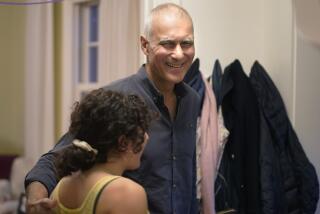Finding on Ulcers Nets Pair a Nobel
- Share via
Two Australian researchers who discovered that stomach ulcers are caused by a bacterium, not by emotional stress or spicy foods, were awarded the 2005 Nobel Prize in Physiology or Medicine on Monday.
Dr. J. Robin Warren, 68, and Dr. Barry J. Marshall, 54, overturned the belief held by physicians for decades by isolating a spiral-shaped bacterium called Helicobacter pylori from humans and ultimately demonstrating that it could produce serious lesions in the stomach.
The researchers “produced one of the most radical and important changes in the last 50 years in the perception of a medical condition,” said Lord Robert May of Oxford, president of the Royal Society. “Their results led to the recognition that gastric disorders are infectious diseases, and overturned the previous view that they were physiological illnesses.”
The pair faced years of ridicule, not only from scientists but also from a pharmaceutical industry that was heavily invested in producing antacids for controlling the symptoms of ulcer.
The ultimate acceptance of their idea began when Marshall swallowed a flask of H. pylori, developing a severe case of gastritis. Acceptance grew when physicians observed that ulcers could be speedily cured with a short course of antibiotics and bismuth compounds that killed the bacteria.
“I was treating my patients with the then-traditional methods for ulcers when his work was first published, and I truly did not believe it until I saw what it did for my patients,” said Dr. David Peura of the University of Virginia, where Marshall taught for 10 years.
Researchers now know that H. pylori causes more than 90% of duodenal stomach ulcers and 80% of upper intestinal ulcers, the Nobel committee said. The remainder are caused primarily by overuse of aspirin and similar drugs, which eat away at the stomach lining.
Warren, who retired five years ago from Royal Perth Hospital, and Marshall, a microbiologist at the University of Western Australia, were dining together in a restaurant in Perth when Warren got a call on his cellphone informing him of the prize.
“I was shocked,” he told the Swedish news agency TT. “When they first rang, I did not believe it was true, that it really was the Nobel committee.”
Warren had previously said of the 1982 identification of the bacterium, “I thought it was a new and exciting discovery, but I did not believe it was the type of discovery that one got the Nobel Prize for.”
Marshall professed delight with the award. “Obviously, it is the best thing that can ever happen to somebody in medical research,” he told Associated Press.
The work began in 1979 when Warren, a lifelong pathologist, observed an apparent bacterium in the lower part of the stomach in more than half the patients from which biopsies had been obtained. He also noted areas of inflammation around the bacteria.
The discovery was surprising because physicians had argued for decades that the interior of the stomach was too acidic for any bacteria to grow there.
“When I said they were there, no one believed it,” he told AP.
Marshall, then a young clinical fellow at the Royal Perth Hospital, was intrigued by the findings and, together, he and Warren performed 100 new biopsies, finding the same organism in the majority of patients and in virtually all those with ulcers.
The bacterium did not infect laboratory animals and proved recalcitrant in laboratory dishes.
Successful cultivation came only after Marshall inadvertently left a culture dish out in his laboratory over the 1982 Easter holiday, allowing sufficient time for the slow-growing bacteria to reveal their presence.
Researchers now know that the bacterium infects roughly half the population around the world, but that only a small proportion of those infected develop ulcers.
The discovery that ulcers were caused by a bacterium led to research on other diseases that might have an infectious origin, the Nobel committee said. Among the conditions where bacteria are now suspect are Crohn’s disease, ulcerative colitis, rheumatoid arthritis and atherosclerosis.
Warren and Marshall will split the $1.3-million award.






